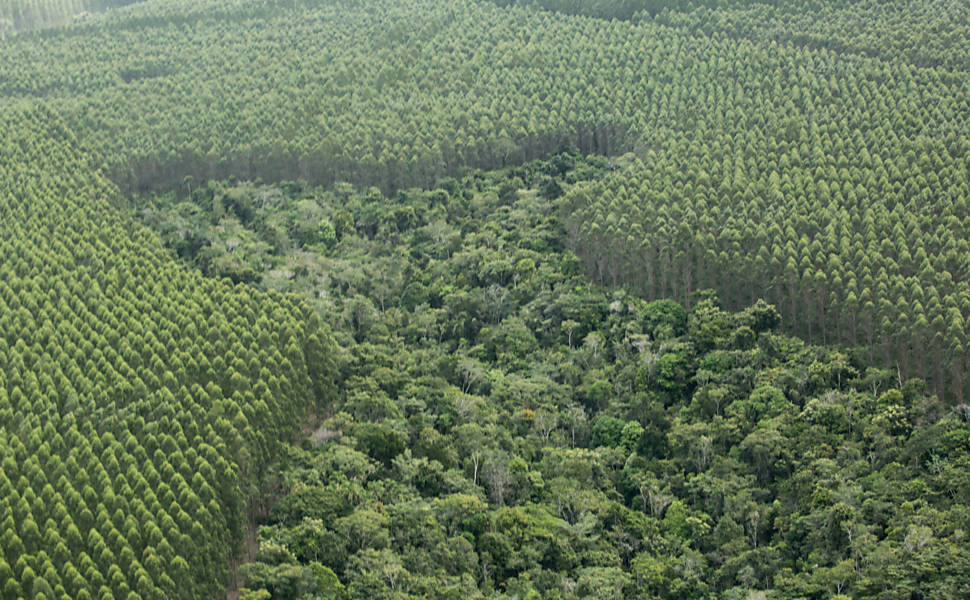Latest Photo Galleries
Brazilian Markets
11h46 Bovespa |
+0,93% | 125.358 |
16h43 Gold |
0,00% | 117 |
11h43 Dollar |
-0,66% | 5,2159 |
16h30 Euro |
+0,49% | 2,65250 |
ADVERTISING
The Region of Brazil's Discovery Is No.1 in Deforestation in the Country, Report Shows
05/29/2017 - 10h04
Advertising
EDUARDO GERAQUE
SPECIAL ENVOY TO SOUTHERN BAHIA
The cycle of destruction of Brazil's Atlantic Forest begun in 1500 by Europeans is now active again in the state of Bahia. This is the result of a forest mapping by NGO SOS Mata Atlântica along with Inpe, Brazil's National Institute of Space Research.
A deforestation atlas to which Folha had access shows that Bahia became the No.1 deforesting state in the country between 2015 and 2016, largely driven by the reduction of the Atlantic Forest in the state. In Bahia, 12,288 hectares of vegetation were destroyed – a 207% hike in comparison with the previous analysis, made in 2014-2015.
Three cities in the south of Bahia - Santa Cruz de Cabrália, Belmonte and Porto Seguro - are responsible for half of this total.
A biome that is home to 72% of the Brazilian population, the Atlantic Forest covers areas from the states of Rio Grande do Sul, in the south of the country, to Piauí, in the northeast. Deforestation increased by 57.7% across the country in comparison with the previous year. The areas covered by forest declined by 29,075 hectares.
The figures worry specialists of SOS Mata Atlântica. Ten years ago, the Atlantic Forest biome was not suffering deforestation in this proportion.
CABRÁLIA
Interestingly, the current deforestation of the Atlantic Forest in the south of Bahia includes elements connected to the historic cycle of the colonial period. Some geographic and socio-environmental factors of the deforestation did not change.
The first mass in Brazil occurred in the region of what is Santa Cruz de Cabrália today. The Native Brazilians lived there in a rich forest and Brazilwood became valuable raw material, leading to several disputes for the territory.
Scientific estimates indicate that for two centuries, from 1500 to 1700, more than 460,000 species of the tree that the country was named after were removed from the exuberant forest, now known as Atlantic Forest.
The colonial deforestation process, which virtually destroyed all species of Brazilwood in the country, involved from business owners (Europeans who exported wood and made dyes) to Native Brazilians, who bartered the wood.
Later in a second period, slaves also took part. All, due to different types of pressure or domination, participated in the destruction. The same city of Cabrália, along with Belmonte and Porto Seguro, are among the top five loggers.
With the aid of satellite coordinates, the field expedition, along dirt roads between deserted private properties, gives shape to the destruction.
The numbers surveyed for analysis show that 3,058 hectares of Atlantic Forest were cut down in Cabrália - more than 10% of the total Atlantic Forest areas deforested in the country.
The reasons that led to the increase in deforestation in the region are not clear yet. In the news report team's recent visit to the region, the areas were being cleared and the wood was taken away on trucks.
In neighboring properties, the eucalyptus farms had already swallowed the native forest in previous years, which might have occurred again, specialists say.
However, not all forms of deforestation seen from above are illegal. The satellite mapping does not show whether the wood in an area was cut down legally.
Some of the deforestation, mainly in public areas, is made by Native Brazilians or people who are underemployed.
Journalists EDUARDO GERAQUE and DIEGO PADGURSCHI traveled to the south of Bahia at the invitation of NGO SOS Mata Atlântica.
Translated by THOMAS MUELLO




